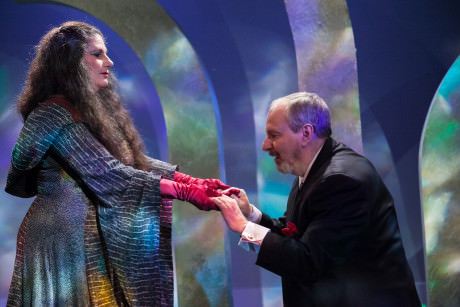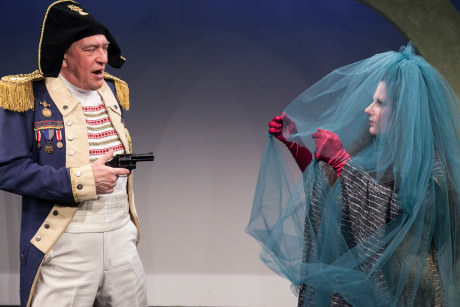People rarely go to the theater anymore to know what a playwright thinks. We go to be entertained, we go to be moved, we go to be told stories, which might involve hearing what assorted characters think. But apart from Tony Kushner and his ilk (does Kushner even have an ilk?), playwrights these days seem to think it gauche or louche to put their own opinions on stage.

George Bernard Shaw—who wrote the two wit-rich and idea-dense plays currently receiving a fascinating and rewardingly listenable production by Washington Stage Guild—is perhaps the preeminent practitioner of the notion that live theater ought to be a conveyor of ethical values. But Shaw’s long gone. These days, if live theater has any social utility to speak of, it’s to boost restaurant revenues, gentrify neighborhoods, stimulate tourism, encourage real estate development, and the like. But no one goes around arguing that live theater will have an edifying effect on a society’s ethics. The response would be a resounding pshaw.
How did we get to a point where live theater that presumes to be an uplifter of morals is written off as not good theater? The immortal words of the playwright Moss Hart have become theater’s unexamined maxim: “If you have a message, call Western Union.” (The quote is also attributed to producer Samuel Goldwyn, actor Humphrey Bogart, and novelist Ernest Hemmingway.) The ostensible truism is kind of weird given how much messaging everyone does nowadays online. Cyberspace is teeming with opinionizing. Some of it’s rude, some of it’s revelatory, but no one decides to unplug because opinionizing per se is so dé classé. Except that playwrights (or the deciders who pick plays to program) seem certain that audiences will surely tune out at authorial intellection that hints at a moral compass.
Some of the most commercially successful serious theater depicts reprehensible behavior. Scandalous behavior, horrific behavior. But just because a character gets his or her comeuppance for bad behavior does not mean that an ethical principle has been conveyed. Just because a character who seems to be good is revealed to have done something egregiously bad does not send an ethical message. Even theater in which bad things happen to good people has appeal—but there’s no moral in the story applicable to everyday or societal ethics. The playwright may or may not have a recognizable moral frame around the work. Some, such as Neil LaButte, usually do; some, such as Wally Shawn, really don’t. In almost no case does an author’s or a play’s or a character’s observable ethics become manifest in people’s personal morals after they leave the theater. People either enjoy or don’t enjoy. They don’t become better. That’s not why they go and that’s not why they come back. And everyone assumes they’ll stay away from any play that tries to preach.
So does that make Shaw a relic for the trash heap of history or a prophet for our times?
One of the things that’s so engrossing about the experience of attending to Washington Stage Guild’s current double bill (two-fifths of Shaw’s epic five-play Back to Methuselah) is that it shows Shaw to be the latter. We get to hear language that speaks of actual thinking by an actual thinker, someone with a vision of what needs to be. It’s a futuristic vision with awesome breadth and depth. And the characters, each and every one, are scintillatingly eloquent. There are none of the. Text. Stunts / that, you know. Well, um. // Contemporary playwrights use to. Notate. / the endemic inarticulateness of our / you know, um. Times.
Shaw was a playwright who did not shirk from undertaking the immense and important task of teaching people how to be better people. And interestingly, in doing so, he comes down on one side of an argument about art that goes back to 330 BCE, when the philosopher Aristotle wrote a treatise called “Poetics” in which he built a case for the ethical utility of art in society. He was talking back to his teacher, Plato, who had made the opposite case. In fact Plato went so far as to banish poets from the perfect society, because in representing mere appearances of reality, poetry misleads and deceives and is therefore morally suspect. Plato views are dated (“Banish the theater!” is so pre-Restoration). But so are Aristotle’s. Today’s audiences tend to believe art is art. Great art is great art. But to the extent there is any ethical utility anywhere among civilized societies, it ought not reside in Art.
Shaw would say a resounding Not so fast. If you catch these two shows you’ll catch his drift. Washington Stage Guild’s The Thing Happens and The Tragedy of an Elder Gentleman are to smart theatergoers as fine dining is to gourmands. The diction is delicious, the ethical intellection is savory, and it won’t leave you hungry for substance after.

Back to Methuselah plays through March 15, 2015 at Washington Stage Guild performing at the Undercroft Theatre of Mount Vernon United Methodist Church – 900 Massachusetts Avenue, NW, in Washington, DC. For more information and for tickets, call (240) 582-0050, or purchase them online.
LINK
Robert Michael Oliver’s review of Back to Methuselah on DCMetroTheaterArts.





Bravo! A beautiful reflection on these glorious plays.